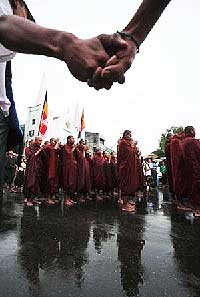September 26, 2009

Although the Burmese junta released 7,114 prisoners in an amnesty last week, it included only 128 political prisoners—and just four out of more than 200 monks now behind bars.
Meanwhile, according to the Assistance Association for Political Prisoners-Burma (AAPP), a human rights group based in Thailand, the junta continues to round up monks suspected of subversive activities.
“bout 20 monks were arrested in September. We are still in the process of identifying them,” said AAPP Joint Secretary Bo Kyi, adding that the Burmese authorities are still keeping a close eye on monks.
Thousands of monks were arrested following the crackdown on the mass protests of September 2007, known as the Saffron Revolution because they were led by saffron-robed monks demanding political reforms. Most were released after a brief period of detention, but at least 237 monks remain in prison, some serving sentences of more than 60 years.
Although Burma’s ruling generals are avowed Buddhists, this has not prevented them from coming down hard on the monks, who are traditionally revered in Burma’s predominantly Buddhist society.
“The junta doesn’t treat the detained monks with respect. They tortured and abused them when they raided the monasteries, and have continued to mistreat them in the prisons,” said Bo Kyi. “Their only thought is that anyone who challenges them is their enemy.”
Former political prisoners interviewed by The Irrawaddy said that prison life is especially hard on monks.
“After they arrested me, I suffered many humiliations. The first was when they disrobed me by force,” said Pyinnya Jota, one of the leaders of the Saffron Revolution, who was imprisoned twice and later fled to Thailand.
Although the monks are stripped of their status when they are put in prison, most try to continue to observe monastic rules. This includes eating only twice a day, both times before noon.
However, the monks’ first meal of the day, normally eaten shortly after the dawn alms round, when food is collected from devout laypeople, is not available in prison. This means that monks can eat only once a day, at midday, resulting in malnutrition and other health problems.
Some monks try to solve this problem by setting aside their afternoon meals for the following morning. However, under prison regulations, prisoners are forbidden to refuse food when it is given to them.
“Some prison officials will let us hold on to our dinner so we can eat it the next morning. But others punish us for keeping food in our cells,” said a monk in Rangoon who is a former prisoner.
“If that happens, they try to force-feed us. This is why it is so difficult to keep our monastic vows in prison,” said the monk, speaking on condition of anonymity.
Some monks also complained that their jailers refused to address them by their monastic names—an act of disrespect that they saw as more than just a personal affront.
“This is an insult to the entire Buddhist community, like referring to the Buddha by his lay name,” said a young monk in Rangoon who was briefly detained during the crackdown on the Saffron Revolution.
Another monastic practice—shaving the head as a symbol of severing worldly ties—is also forbidden in prison, effectively denying the monks of any recognizable sign of their religious identity.
Ironically, monks detained for political reasons were treated much better during the British colonial era than they are today. At that time, monks were separated from other prisoners so they could maintain their vows.
This changed under the dictatorship of Ne Win, whose Burma Socialist Programme Party (BSPP) abolished the separation of lay and monastic prisoners, declaring that “socialism treats all people equally.”
The BSPP also made it a rule to forcibly disrobe monks arrested for political offenses—a practice the current regime applies zealously in its efforts to deprive its monastic critics of their moral authority.
Besides their unique status, another reason the junta is especially fearful of monks is that the monastic community, the sangha, is the only institution that rivals the military in size and organization.
There are estimated to be around 400,000 monks in Burma, compared to 350,000 soldiers. Apart from performing religious duties, they also play a key role in education, social work and disaster relief efforts, as witnessed during the aftermath of last year’s Cyclone Nargis.
“Monks are highly respected by Burmese people, for many reasons,” said Bo Kyi. “But the regime thinks that by arresting, disrobing, torturing and mistreating them, it can reduce them to something less than they are.”
By WAI MOE
Source : www.irrawaddy.org




